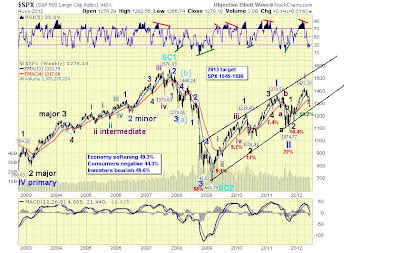Warren Buffett, the billionaire chairman of Berkshire Hathaway Inc. (BRK/A), said he expects the U.S. economy to avoid another recession as long as Europe can contain its debt crisis.
There won't be a recession "unless events in Europe develop in some way that spills over here big-time," Buffett said yesterday at the Economic Club of Washington, D.C. He answered questions from David Rubenstein, co-chief executive officer of Carlyle Group LP (CG), the world's second-largest private equity firm.
Europe's sovereign-debt crisis threatens to destroy the region's 17-nation currency union. Finance ministers and central bank governors from the Group of Seven economies agreed yesterday to coordinate responses to the crisis as Greece contemplates leaving the euro. European leaders need to resolve some of the union's weaknesses, Buffett said.
"They're in on a common currency but they're not in on a common fiscal policy or a common culture or common labor practices," Buffett said. "They have to reconcile some of these things."
U.S. employers added the fewest workers in a year in May and the economy expanded at a 1.9 percent pace in the first quarter, government reports showed last week. Buffett has been building Berkshire's stock portfolio and making capital investments at the company's railroad and utility units as he bets on growth in the U.S.
Berkshire's Leadership
Buffett, 81, who is also CEO of Omaha, Nebraska-based Berkshire, has been preparing the firm for his eventual departure. He told shareholders in his most recent annual letter that the board has a candidate for CEO and two backups, without naming the executives. Vice Chairman Charles Munger is 88.
Berkshire is "in perfect shape," Buffett said at yesterday's event. "We've got successors that are, in most ways, better than I am."
Buffett has said that his roles would be divided upon his retirement. His son Howard Buffett, a farmer and Berkshire director, would be an effective non-executive chairman, Buffett has said. Berkshire has hired former hedge fund managers Todd Combs and Ted Weschler to help oversee investments.
Buffett announced in April that he'd been diagnosed with stage 1 prostate cancer that is "not remotely life threatening." He said he planned to begin a two-month treatment of daily radiation in July. The regimen will restrict his travel without otherwise changing his routine, Buffett said.
Buffett's Deals
Buffett built Berkshire over four decades by acquiring businesses including car insurer Geico Corp. and betting on stocks like Coca-Cola Co. His firm has amassed an $89.1 billion portfolio of equities, including a stake in General Motors Co. disclosed last month and International Business Machines Corp. shares acquired last year for more than $10 billion.
Berkshire spent $26.5 billion on the takeover of railroad Burlington Northern Santa Fe in 2010, a deal Buffett called an "all-in wager on the economic future of the United States." His firm acquired engine additive-maker Lubrizol last year for about $9 billion.
"I'm looking for one good idea a year," he told Rubenstein. "We're in June, incidentally, David, if you want to help me out."
Individuals should invest in index funds every month and avoid betting on specific stocks, Buffett said.
"The average person who just consistently buys equities -- which to me are by far the most attractive investment choice around -- at the end of 20 or 30 years, they'll do very well," he said.
Business at Berkshire's units can provide Buffett with a gauge of economic growth. At the end of 2011, Berkshire units, which range from insurers and retailers to a provider of luxury air travel, had 270,858 employees. That was up from 260,519 a year earlier, according to the company's annual reports. Employment at Burlington Northern grew by 1,000, while builder Clayton Homes cut 466 jobs amid the deepest housing slump in seven decades.
To contact the reporter on this story: Zachary Tracer in New York at ztracer1@bloomberg.net
To contact the editor responsible for this story: Dan Kraut at dkraut2@bloomberg.net




























